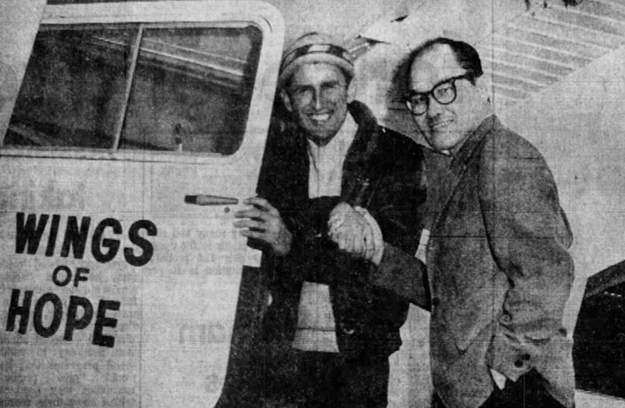Date: February 25, 1973
Location: Carbondale, IL
By: Rich Redicker
Newspaper: Southern Illinoisan
Page: 2
Southern Illinois is playing a role in helping people in African and Latin American countries.
For the past five years, planes that have been rebuilt and maintained, and pilot-mechanics that have been trained in this area, have been instrumental in supplying air transportation for remote areas of the world.
E.A. “Tony” DaRosa, chairman of the aviation technology division, Vocational-Technical Institute, Southern Illinois University at Carbondale, has been helping Wings of Hope, a St. Louis-based charitable organization.
Wings of Hope transports medicine, food and people in such places as Africa, New Guinea, Mexico and some South American countries.
DaRosa, who is technical advisor to Wings of Hope, offers the facilities of his program at Southern Illinois Airport to the charity in two ways.
He maintains their equipment as well as training pilot-mechanics for the program.
Sink Manning, one of DaRosa’s graduates, is leaving this week in a Wings of Hope plane for Guatemala. Manning is going to help move some Guatemalans from overpopulated mountains to uninhabited jungles that haven’t seen civilization for over 2,000 years.
Manning said there are no roads and if Wings of Hope didn’t help, there would be no way for those people to move.
Besides the colonization program, Manning is also going to help in relocating people in earthquake stricken Nicaragua.
Manning has recently completed a 50-day on-the-scene training program in Peru under the guidance of Ed Schertz, an SIU aviation graduate and a Wings of Hope pilot there.
Manning said that in Peru they found a lost boat that couldn’t have been located without a plane, and transported supplies in one hour that would have taken two months by river. He said they also flew a boy having bone problems and a woman having childbirth problems to a hospital.
The aviation program completely rebuilds planes for Wings of Hopeand charges only for parts. DaRosa said it is a “fantastic experience for the students and saves SIU the cost of buying training parts.”
DaRosa has long supported the idea of training people to maintain as well as fly a plane. He said this cuts down the cost of having an extra mechanic along on flights and greatly cuts down the dead (non-flying) time of the plane.
DaRosa said that the pilot, since he is also a mechanic, is more sensitive to his plane. He is better able to tell if something isn’t working perfectly and also is able to fix it.
When he first started flying in 1930, pilots used to wish one another, “Happy Landings,” DaRosa said. He said this is no longer necessary, if pilots understand how their plane works.
Wings of Hope does not charge anybody for its services. It runs completely on private donations.
A brochure on the organization, which has been in existence for seven years, said, “we’re a United States group dropping mercy from the skies instead of bombs.”
